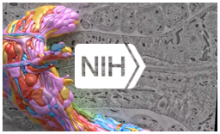
Recent meetings of the NIH BRAIN Initiative Neuroethics Working Group (NEWG) and Multi-Council Working Group (MCWG) included discussion of improving scientific communication and engagement, presentations from neuroethics grantees, updates from BRAIN federal partners, and an overview of ongoing BRAIN efforts.
On August 19th, 2019, National Institutes of Health (NIH) Brain Research through Advancing Innovative Neurotechnologies (BRAIN) Initiative®’s Neuroethics Working Group (NEWG) held its eighth meeting. This group of experts in neuroethics and neuroscience serves to provide the NIH BRAIN Initiative with input relating to neuroethics. Participants at the meeting discussed the current state of the BRAIN Initiative, ways to improve communication about neuroethics and other scientific issues, and provided updates on four BRAIN-funded projects on neuroethics.
Dr. Walter Koroshetz, NINDS Director, provided an update on the current status of the BRAIN Initiative, including updates on the planning of the second phase of the Initiative, dubbed BRAIN 2.0. He also discussed recent BRAIN-funded studies with potential ethical implications regarding the use of human subjects and brain recordings from those patients. Next, Dr. John Besley (Michigan State University) presented on how scientists communicate to the public and what their goals may be for such communications. He also discussed various tactics and channels used in public communications, with an over-arching message that strategic communication should be driven by goals. The meeting concluded with research talks from four BRAIN neuroethics-funded investigators: Drs. Winston Chiong (UCSF), Cynthia Kubu (Cleveland Clinic), Gabriel Lazaro-Munoz (Baylor), and Kate MacDuffie (University of Washington). For more information, please view the NEWG meeting summary(pdf, 145 KB) and the archived videocast.
The following day, on August 20th, the NIH BRAIN Initiative Multi-Council Working Group (MCWG) convened its fourteenth meeting. The MCWG works to ensure a coordinated and focused effort on BRAIN across NIH and provides ongoing oversight of the long-term scientific vision of the BRAIN Initiative.
In opening remarks, Dr. Koroshetz welcomed the following new MCWG members: Drs. Hollis Cline (Scripps Research Institute), Alfred Emondi (Program Manager, DARPA), David Holtzman (Washington University School of Medicine), and Yael Niv (Princeton). In addition to providing an update on BRAIN 2.0 efforts and recent scientific advances, he described ongoing efforts from the NIH BRAIN Initiative to improve diversity, as well as targeted outreach opportunities at scientific conferences.
Dr. Emondi gave an update on DARPA’s contribution to the BRAIN Initiative, and Dr. Sri Raghavachari, Program Director at the National Science Foundation (NSF), presented an update on NSF’s BRAIN activities. Following these updates, Dr. Bruce Tromberg, NIBIB Director, gave a presentation on the growing importance of bioengineering in medicine and summarized NIBIB-supported technologies that are or could be harnessed by the BRAIN Initiative. Next, Dr. Yael Niv presented a summary of her latest research exploring the role of orbitofrontal-hippocampal neural activity patterns in human decision-making. Finally, NIH staff provided an overview of a portion of the BRAIN portfolio, covering identification of cell types and cell diversity (such as the large-scale coordinated project, BRAIN Initiative Cell Census Network, BICCN), as well as generating circuit diagrams to map the brain. For more information, please view the MCWG meeting summary(pdf, 83 KB) and the archived videocast.
The next NEWG and MCWG meetings will be held on January 30th and 31st, 2020, respectively.
